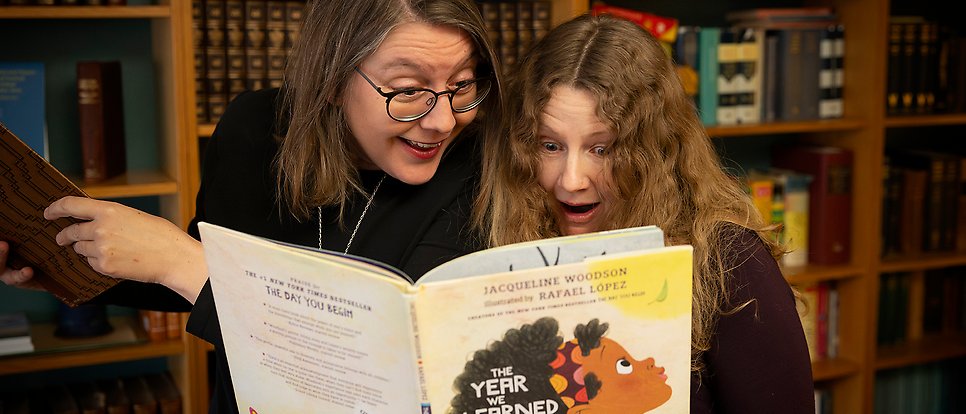PUMA funds inspire lifelong reading

Sofia Ahlberg and Suzanne Ericson want to inspire lifelong reading as part of teacher education. Photo: Mikael Wallerstedt
In 2023, SEK 3 million in PUMA funding was available for projects. One of the projects that received funding is Lifelong Reading: Teaching Activities to Encourage a Love of Literature in Primary School Teacher Trainees and Their Future Students.
The project is run by the Department of English. Senior Lecturer Sofia Ahlberg applied for the funding, but doctoral student Suzanne Ericson is driving the initiative. In total, the project received SEK 44,741 in the area of educational innovation and development.
How did your application for funding come about?
“The idea for the project was born in the classroom,” according to Ericson. “As course coordinator and seminar leader, I noticed that some students were not reading the literary texts they were supposed to work on. Engagement was usually higher in the more practical activities. In the discussions, students compared the course texts with films they had seen.”
From this, the idea was born to introduce more playfulness and a focus on film to encourage more students to read the course literature.
“It is our responsibility as language teachers to inspire lifelong reading as part of teacher education,” adds Ahlberg.
Tell us more about the project.
“The aim of the project is to enhance the students’ motivation and interest in lifelong reading,” explains Ericson. “We wanted to get input from students and primary school teachers to make the most relevant and attractive changes possible.”
But what does PUMA stand for?
“PUMA stands for funding for educational development,” explains Ahlberg. “PUMA funds give us the opportunity to strengthen and develop our teaching initiatives and an opportunity to develop research-based teaching. It is the interaction between theory and practice that is important here.”
Developed teaching benefits everyone, she notes, from those responsible for education and research and the students at Uppsala University to wider society.
How has the money been used in the project?
“On people in particular,” replies Ericson. “We wanted to create a mixed group and the money allowed us to invite a primary school teacher and two students of education who had recently participated in the course. It was important, in our view, to be able to pay the students, as that emphasises that their opinions and work in the group are important parts of the project.”
A major challenge was to find times where everyone could meet. Some of the work was done in small groups, sometimes remotely.
“One highlight was when we held a workshop with everyone on site, it was great fun,” says Ericson.
The project will be completed in the spring term of 2024 and will be reported in written form.
“We’ve also shared part of the project with our colleagues at the Department of English and at Uppsala University’s conference on academic teaching and learning in 2023,” says Suzanne Ericson.
Sofia Ahlberg concludes:
“We have happily already seen through exchanging experiences with other teachers who have been granted funding that the PUMA projects are contributing to the planning and development of teaching methods at our University.”
Ulrika Hurtig
Facts
The application period for next year’s PUMA funding opened on 31 January 2024. The deadline for applications is 20 March 2024.
For the 2025 financial year, a total of SEK 2 million in PUMA funding will be available. Each project can receive a maximum of SEK 250,000, but if the work is interdisciplinary or multidisciplinary and involves collaboration between different disciplinary domains, the projects can receive up to SEK 350,000. The project must be co-financed by the department(s) in question.
The project funds are distributed across five different areas:
Educational renewal and general educational development
AI, digitalised teaching and eLearning
Sustainable development
Internationalisation and intercultural communication
Lifelong learning
